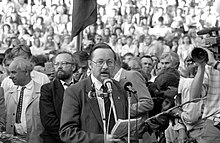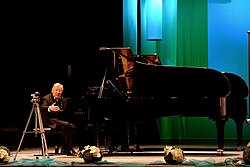Vytautas Landsbergis
He has written 20 books on a variety of topics, including a biography of Mikalojus Konstantinas Čiurlionis, as well as works on politics and music.
He is a founding signatory of the Prague Declaration,[1] and a member of the international advisory council of the Victims of Communism Memorial Foundation.
His mother, ophthalmologist Dr. Ona Jablonskytė-Landsbergienė, assisted her sister's family in sheltering a Jewish child, Avivit Kissin, from the Holocaust.
On 11 March 1990, he headed the Parliamentary session during which the restoration of Lithuanian independence from the Soviet Union was declared.
Landsbergis also played a crucial role during the confrontation between the Lithuanian independence movement and Soviet armed forces in January 1991.
[7] Since 2015 Landsbergis is together with Roswitha Fessler-Ketteler, MEP Heidi Hautala, Aleksi Malmberg and Frank Schwalba-Hoth member of the advisory board of the Caucasian Chamber Orchestra association and its German "Förderverein".
Finally, at the end of February 2005, the European Union dropped proposals to ban Nazi symbols across its 25 member states.
He warns that Russia might have intentions to control Lithuania and the other Baltic States economically and politically through a wide network of former KGB agents and other clandestine activities.
Landsbergis is one of the most active politicians who urge Russia to compensate Lithuania and other post-Soviet republics for damage done to them during their occupations.
In 2019, Vilnius's mayor, Remigijus Šimašius, renamed a street that had been named after Kazys Skirpa (who formed the Lithuanian Activist Front, which massacred Jews across Lithuania) and removed a memorial to Jonas Noreika (who ordered and oversaw the killings of Lithuanian Jews in Plungė during the Plungė massacre).
Landsbergis posted a poem on social media that referred to the Virgin Mary as a "žydelka" ("jew-girl"), and Faina Kukliansky, chair of the Jewish Community of Lithuania, condemned it.
[10] Landsbergis said the poem was an attempt to show the ignorance of Lithuanian antisemites and requested support from "at least one smart and brave Jew ... who does not agree with Simasius.
"[10] The question of whether V. Landsbergis should be officially acknowledged as the head of state of Lithuania from 1990 to 1992 has been polarising the Lithuanian public for many years.
On 25 June 2022, the Lithuanian Seimas officially approved the bill regarding V. Landsbergis' recognition as the head of state.
[11] "The bill is a symbol of respect and acknowledgement of a person who played a significant role in Lithuania’s history," the Speaker of Seimas, V. Čmilytė-Nielsen, said.
"[12] The latter was a collective political entity consisting of 11 deputies possessing equal powers,[13] which was disbanded on 22 November 1992, when the current Constitution of Lithuania was adopted.




